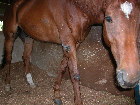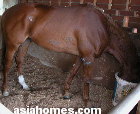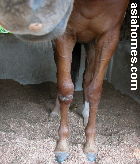Educational tips for pet lovers
The horse paws
his front toes continuously
 "Doc, I have a
problem," the stable manager said gravely and slowly over the mobile phone.
"A horse fell and is in great pain. Please come now." "Doc, I have a
problem," the stable manager said gravely and slowly over the mobile phone.
"A horse fell and is in great pain. Please come now."
Horses and riders do fall. I did not think it was an emergency as to leave my surgery
and to drive through the traffic jams to the riding club to treat this horse.
"How do you know that the horse is in great pain?" I asked, reluctant to leave
my dog and cat patients in the waiting room. Dog and cat clients do not like to wait long
for their turn and once I go out to the riding club, there would be at least one hour's
wait for all of them. And they had prior appointments. Therefore, should I
respect the importance of the clients' time and not treat this one horse as an
emergency?
 The stable manager said, "The horse kept pointing its front leg at the
ground and scraped backwards non-stop, alternating one front leg with another." The stable manager said, "The horse kept pointing its front leg at the
ground and scraped backwards non-stop, alternating one front leg with another."
A normal horse would not do that. Thoroughbreds are sensitive animals and if I don't
relieve their intense pain, they sometimes collapse and die. Dogs can tolerate pain
much better. I explained to the clients about this emergency and rushed to the riding
club.
The horse looked distressed as it tip-toed on its left fore leg and pawed the road
surface. It had bolted from the paddock situated on a small hill, fell down a 45
degree slope and hit the hard tarred road on its right side. All 500 kg of its weight. The
pain was tremendous.
I arrived within 15 minutes of the accident as there was no traffic jam.
It would aggravate its injury if the pain killer had not been given within 15 minutes. It
would have developed an elephant leg if  left alone for the next 24 hours. By that time, no drug would help and the horse
would be as stiff as a 3-legged horse would be. left alone for the next 24 hours. By that time, no drug would help and the horse
would be as stiff as a 3-legged horse would be.
Immediately after the injections, it felt good and commenced eating. The busy stable
manager was relieved and went back to his heavy load of administrative work.
"This horse slipped under the starting gate and nearly killed a jockey," the
manager told me.
"Why was it not euthanased?" I asked. I had the impression that this was a
fractious and fiercely independent wild horse who dislodge riders. "It is an
excellent horse for riding," the manager explained.
"He fell once sometime ago," the manager said. "On the same side, I
believe."
Still, there was the internal bleeding and swelling to consider in the treatment of this
horse. It looked fine now but there would be small bleeding. I was worried about the
'elephant leg' being developed in the next 2 days.
Horse vets are labelled 'incompetent' by the horse people whenever the horse had not
responded to treatment. Sometimes there was a considerable delay of over 48 hours before
veterinary advices were sought as the owner wanted to save money.
 In this traumatic situation, I
gave it an anti-inflammatory injection to bring down much of the inflammation. Did it
work? In this traumatic situation, I
gave it an anti-inflammatory injection to bring down much of the inflammation. Did it
work?
Yes. The drug helped considerably to prevent
the 'elephant leg' syndrome. There was a slight swelling on the right knee on the 3rd day
and the horse was eating well. Of course, it had 3 days of antibiotic cover and the
stable
hand or syce was conscientiously spraying a bluish medicine, 'good for wound healing', the
manager said. No flies dared to land on the wounds. This was a gentle horse.
As to its propensity to stumble, I believed it was due to it
being unable to balance itself on gradients. Its
left foot was a club foot which means that the width of the foot was narrower than normal.
It would not be balanced on a slope.
Asiahomes Internet
asiahomes.com/singapore_classified
Blk 1002, Toa Payoh Lor 8, #01-1477,
Singapore 319074, Republic of Singapore
Mobile Tel: +65 9668 6468, 9668 6469
Tel: +65 6254 3326, 6254 2728
Fax: +65 6256 0501, 64545 843
Email: judy@asiahomes.com |